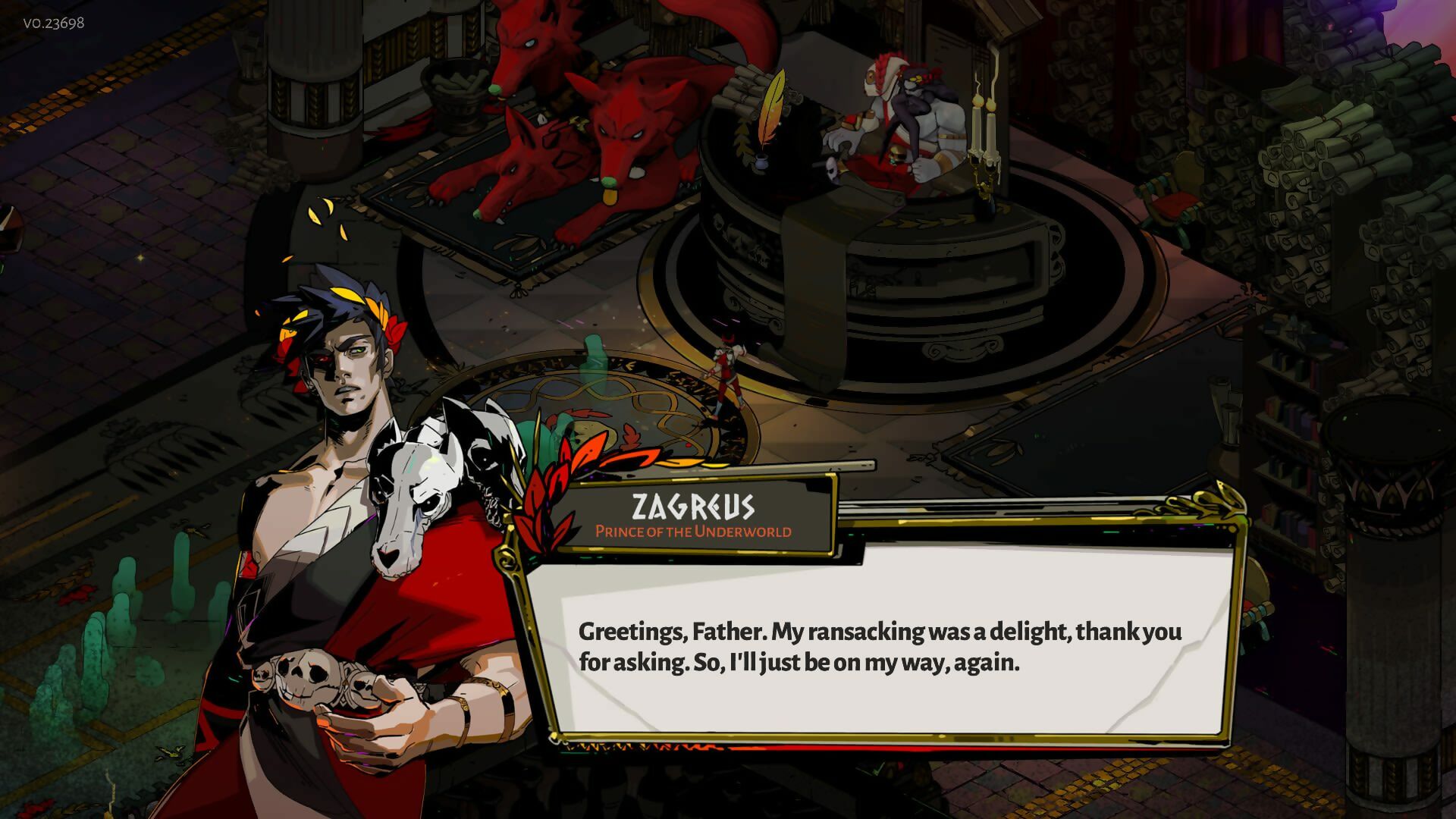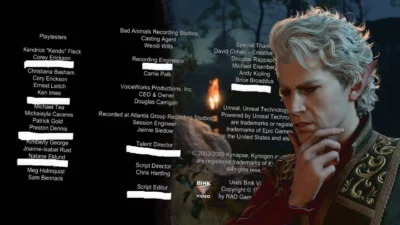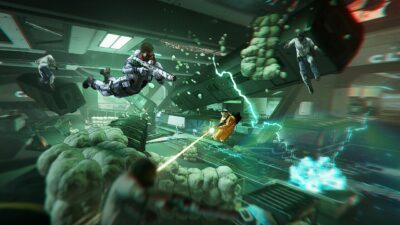
What’s the purpose of story in a video game? This question lies at the heart of both the writing and narrative design disciplines. Is it just a context for gameplay, or to compel the player to keep playing rather than tiring of the game mechanics? Or is it to stab the player in the feelings, to teach them a little about themselves, and to expand their mind the way that great works in other media so often do?
In Pyre, the player guides a group of exiles across a blasted landscape known as the Downside, which they’ve all been banished to by the Commonwealth, a problematic nation in need of revolution. Three of your outcasts at a time compete in religious sporting rituals known as rites. At the end of each event, the winning team nominates one member to be ‘Liberated’; forgiven of their crimes, they’re transported back to the Commonwealth.
Winning a championship and selecting a character to liberate is a difficult choice, since you lose both their strategic value as a player (and therefore possibly your ability to get more people freed down the line), and you lose their social presence between matches. But you also have further competing motivations: you’re attempting to seed a revolution in the Commonwealth, and the revolution’s degree of success depends on you sending back the most suitable individuals.
Beyond that even, you come to care for these characters. Each one makes a compelling case to be released, and it’s impossible to liberate all the characters since you only get seven rites. In fact, some of your competitors will make convincing cases to be released, leading to situations where you’ll consider throwing a match.
In my last column, I defined the gold-standard Complex Ethical choice as being a decision with huge stakes and too many variables to be predictable, and this is why Pyre’s liberation choices are so effective. Furthermore, all choices involve character. Even when deciding whether to take a quick but exposed coastal route to your next match, or go through a jungle (slower, but safer), each is represented by a character arguing for their preference, and the chosen route’s narration reveals a sliver more of that character’s inner life. The downside of this, as a writer? Huge swathes of words are completely missed by every player, because they lie on unchosen branches.

Hades: This interaction plays on your first meeting with Theseus and the Minotaur, but… it’s jarring when you already met the Minotaur ten minutes ago.
Supergiant’s latest story is about Zagreus, son of the mythological Hades, in his endlessly repeating quest to escape the labyrinthine underworld his crappy dad runs. Along the way, you’ll speak to an extended family of gods and mortals, and each time you encounter them, they’ll have new stuff to say. The story particularly advances every time you’re killed and returned to the House of Hades, compensating for your failed attempt by giving you a bunch of characters who’ll have new, well-written things to say, urging you to go again.
Behind the scenes, the story works by queuing up nuggets of dialogue which are tagged with varying levels of priority and have different conditions which must be met before they’re unlocked. When I encounter a character, the game selects the most interesting interaction from the library. So if I recently defeated the character of Meg for the first time, next time I speak to my mentor Achilles, the game will look at the available dialogues and skip over the low-priority characterising chit-chat. It will note that a somewhat higher-urgency conversation about Meg has been unlocked, and serve up that one.
Heaven’s Vault was more or less an entire game of this, as was The Stanley Parable back in 2011, but Hades marks the first time it’s been applied well to an inherently addictive genre. But in Hades, there are so many possible interactions that it frequently becomes unwieldy, and the characters reveal their inner workings. It often presents its content in a strange order, breaking the illusion that these are lively characters eager to talk to me about my latest exploits, like watching a stage actor forget which scene they’re in.

Pyre: One of the game’s many narrative innovations was having additional lore appear when hovering the cursor over key words.
Early on, I made it to the end of the second hell-layer the first time I reached it. More than one character commented on my meeting with the layer’s final boss, then, much later fed me their “Oh, I heard you reached layer two? Good on you!” content. Unfortunately, this means I no longer really see the characters as people, and I’m instead thinking about how to manipulate their programming. After the stumble, I can’t see the stage actor as her character again.
Hades is what happens when a writer writes some greatly branching, variable stuff, then gets frustrated that players don’t see much of it. In order to make the player see more, they make a game with infinite replayability built-in and mostly non-branching content. Now, everyone sees a much larger part of the whole. But what can make interactive narrative choices so compelling is stakes. I need to have something unique to gain, and other things I must therefore lose, in a truly memorable dilemma. Without those stakes, the choice becomes irrelevant. What makes you so invested in Pyre, or Mass Effect, is not that we feel we’ve seen everything, but that we feel the story was uniquely ours.

Hades: Some rooms ask you to choose favourites between gods. This choice could have narrative stakes, but instead, the gods immediately forget your choice.
If the goal of writing in a game is to provide a story engaging enough that you stick around to uncover it all, then Hades does a good job. At 20 hours in, its story hasn’t been emotive or transcendental in the way that even Supergiant’s debut Bastion felt, but I do find myself fascinated by its central mystery: figuring out why this family is so dysfunctional. Fascinated enough to carry me through more gameplay than Pyre.
But if the job of writing in a game is to strike the player in the heart, to give me an unforgettable experience, Pyre wins. Pyre’s critical decision points are agonising, and knowing they’re coming encourages you to spend time thinking about its characters as complex human beings, fleshing out their desires and faults in your head. For my money, Pyre takes it.
SUPERGIANT VS FAILURE
Pyre was the studio’s first attempt to solve the problem of death. The narrative effect of a shift to sports-action gameplay was that failure was no longer an end state. Their characters were freed to process their failures rather than have them erased by a restart, leading to more real-feeling relationships but also meaning the game could respond to a wider spectrum of player performance: shades of victory and also shades of defeat. Inversely, Hades solves death by simply making dying over and over the point. The characters are constantly processing defeat, and only occasionally deal with victory.





